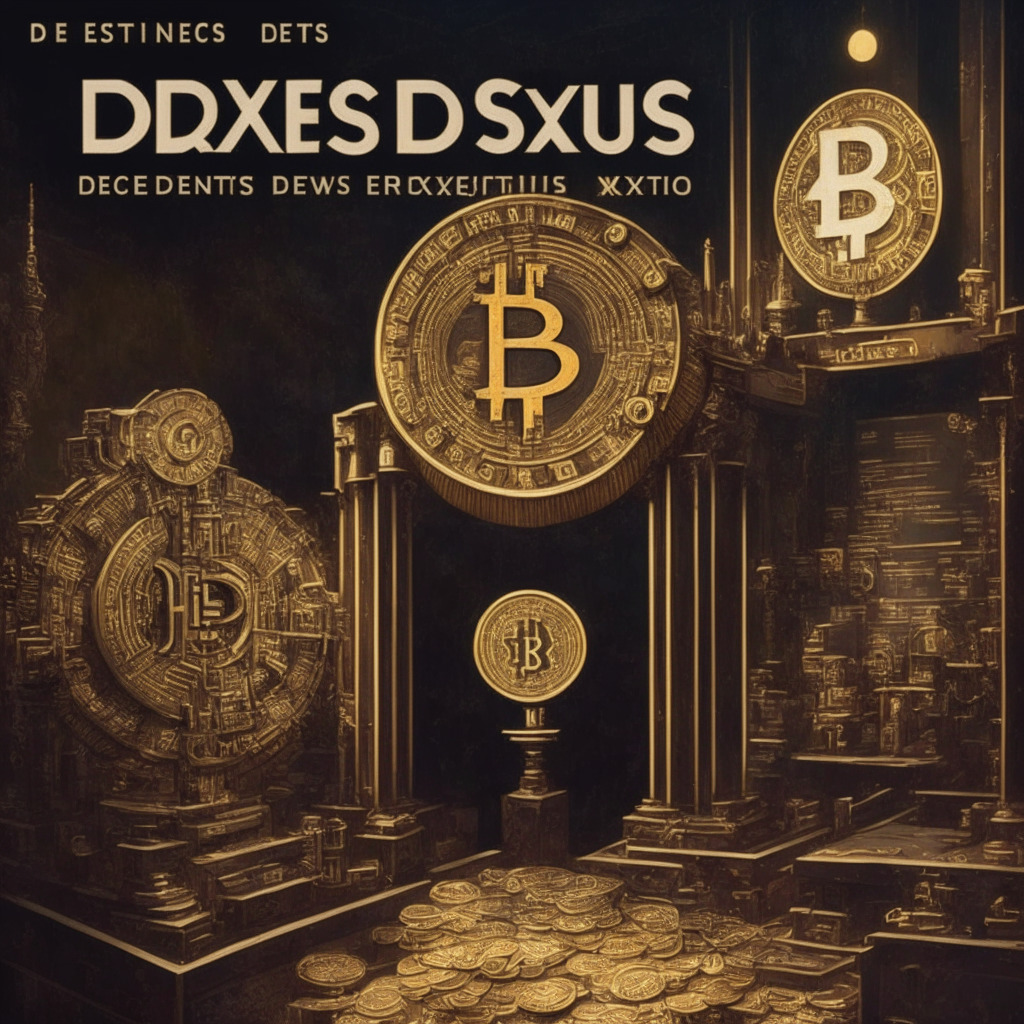“Decentralized finance (DeFi) brings transparency and freedom from centralized authorities, yet lack of regulatory oversight leaves safety in question. Despite allowing for more financial services and privacy, DeFi carries potential risks, including loss of funds due to wrong transactions or lost keys.”
Search Results for: The DeFi Education Fund
SEC’s DeFi Exchange Definition Change: Unintended Consequences and Industry Backlash
The Blockchain Association challenges the SEC’s proposed exchange definition change, arguing that it discriminates against decentralized protocols, imposes greater burdens on distributed ledger technology-based companies, and may drive innovation away from the US. The proposal raises concerns about fair notice, constitutionality, and violation of the Administrative Procedures Act.
SEC’s DeFi Regulation Plan: Potential Overreach or Necessary Protection?
The US SEC’s proposal to extend its regulatory reach to decentralized finance (DeFi) has sparked backlash from the crypto industry. Critics argue that the amendment could result in a de facto banishment of DeFi in the US, with concerns over potential First Amendment rights infringement and hindrance to innovation.
SEC’s DeFi Oversight Expansion: Threat to Blockchain Innovation or Necessary Regulation?
The SEC’s proposal to include DeFi platforms within the definition of exchanges has faced criticism from industry experts, who argue that it would force “de facto expatriation” of DeFi companies from the U.S. The DeFi Education Fund suggests the SEC is telling firms to “centralize, shut down, or get out.” Critics urge the commission to explore alternative regulatory strategies for the evolving DeFi landscape.
Crypto Scams and Hacks: May’s $54M Loss and Unrecovered Funds Raise Concerns
May 2023 saw cryptocurrency market losses of over $54 million due to scams and hacking incidents, with BNB Chain accounting for $37 million across ten cases. Rug pulls accounted for 12 instances with $37 million in losses, while flash loan attacks caused damages totaling $8.9 million. Despite reduced losses, the absence of recoveries raises concerns about the crypto ecosystem’s safety.
Crypto Startups Raise $56M: Spotlight on DeFi, NFTs, and Blockworks’ $12M Funding
Crypto startups received approximately $56 million in funding this week, focusing mainly on DeFi and NFT-related projects. Blockworks secured the largest sum of $12 million, while Pudgy Penguins obtained $9 million and Odsy Network collected $7.5 million. These figures reflect the continued flow of investments into the crypto and Web3 sectors.
Unraveling the Regulatory and Ethical Quagmires: Navigating through the Crypto Landscape
A U.S. federal judge delayed a sentencing hearing for radio host Ian Freeman, who allegedly created an illegal Bitcoin exchange used by scammers. Meanwhile, the DeFi Education Fund contests a patent claim by tech company True Return Systems. Also, DigiFT’s dETH0924 provides up to 4% APR, boosting Ethereum’s PoS mechanism, while crypto infrastructure provider Qredo integrated Circle’s USDC stablecoin into its wallet.
Blockchain Revolution in Banking Meets AI-Generated Fraud: Unleashing Potential or Unraveling Trust?
JPMorgan collaborates with six Indian banks to enable real-time interbank dollar settlements on its blockchain-based platform, Onyx. However, concerns emerge over AI-generated fraud in the crypto and blockchain sectors. Meanwhile, the UK’s APPG proposes recommendations for crypto regulation, and the US Treasury Department’s sanctions on Tornado Cash face legal challenges.
Balancing Financial Security and Privacy: The Tornado Cash Sanctions Debate
The Blockchain Association supports Coin Center’s lawsuit against the US Treasury over its sanctions against Tornado Cash, arguing that the sanction raises regulatory and constitutional concerns. The case outcome could set a precedent for privacy-protecting services in the digital asset industry, emphasizing the need to balance financial security and individual privacy.
Decoding Vitalik Buterin’s Privacy Pool Concept: Navigating Blockchain Privacy & Regulatory Compliance
Ethereum co-founder Vitalik Buterin’s proposed privacy pool concept focuses on combining blockchain privacy and regulatory compliance, sparking meaningful discussion in the crypto world. However, concerns over unclear compliance framework, implementation struggles, and acceptance issues remain to be addressed.
Swyftx’s ‘Learn and Earn’ Initiative: A Catalyst for Crypto Literacy or a Risky Lure?
Swyftx, an Australian tech venture, has begun a ‘Learn and Earn’ program to encourage understanding of the crypto-market, with rewards for participants. However, the initiative could inadvertently encourage naive investment. Nevertheless, with courses designed to identify scams, Swyftx aims to improve crypto literacy and discernment in a market filled with digital currencies and potential frauds.
Navigating Cryptos: Dissecting Asset Handling Strategies from Hodling to Active Trading
“In the uncertain cryptocurrency landscape, experts suggest understanding basics before making bold decisions about investing or trading. Some suggest self-custody for asset control, while others trust institutions like Coinbase. Diversification, focusing on long-term over short-term fluctuations, and safety tools like stop losses are also recommended. Holding on to large-cap cryptocurrencies and using hardware wallets for secure long-term storage are considered safest.”
Navigating the Regulatory Labyrinth: New Rules and Fluctuating Tides in Crypto Sphere
“The United States Internal Revenue Service (IRS) is proposing new tax policies for the sale/exchange of digital assets by brokers, attracting criticism from crypto figures. Meanwhile, Gemini, a cryptocurrency exchange, faces a SEC lawsuit on potential regulatory violations. These developments reflect the ongoing struggle to balance regulation with innovation in the emerging field of cryptocurrency.”
Unraveling the IRS Draft on Digital Asset Reporting: A Regulatory Leap or Misguided Move?
The US IRS has issued draft guidelines on reporting rules for digital asset brokers. Aimed at regulating the digital asset industry, this regulation intends to streamline tax reporting and prevent fraud, proposing to raise $28 billion in fresh tax over a decade. Critics label it as “misguided” and “an attack on the digital asset ecosystem.”
Navigating Crypto Chaos: Launchpad XYZ Simplifies Blockchain for Beginners and Pros
“Launchpad XYZ, a new initiative designed for both newcomers and seasoned pros in cryptocurrency, aims to demystify the complex jargon of crypto and blockchain. Offering a curated portal with access to cutting-edge blockchain projects, it facilitates user control over owned assets and integrates Web3 elements like NFTs and play-to-earn games to educate novices.”
Blockchain Beats: The Future of Web3 Music with Warner Music and Polygon Labs
Warner Music Group and Polygon Labs have collaborated to launch a music accelerator program that fosters innovation in the intersection of music, technology, and Web3. The initiative supports decentralized music projects on the Polygon network, aiming to transform the distribution of music, stimulate artist-fan communities, and explore music-related merchandise opportunities.
Navigating Crypto Investments: Balancing Autonomy, Guidance, and Diversification for Success
The crypto industry’s growth and regulatory efforts open discussions with the SEC, while financial advisors strive to balance clients’ autonomy and guidance. Utilizing blockchain technology, tools are developed for better analysis, promoting diversification, understanding custodianship, and evolving regulations to empower digital asset investors.
Ethereum’s Future: Scalability, Security, and Privacy – Crucial Transitions and Challenges Ahead
Ethereum co-founder Vitalik Buterin emphasizes three critical transitions poised to reshape Ethereum’s future, focusing on enhancing scalability, security, and privacy. Key changes include Layer 2 scaling solutions like rollups, wallet security through smart contract wallets, and increased privacy with features like stealth address methods. Coordination among stakeholders is essential for the platform’s success.
Recovering Stolen Bitcoin: Methods, Challenges, and Protecting Your Crypto Assets
The rise of cryptocurrencies has led to an increase in DeFi scams, making it challenging for victims to recover their stolen assets. By collaborating with law enforcement, cybersecurity companies, and reputable exchanges, as well as implementing best practices for security, individuals and organizations can enhance their chances of recovering stolen Bitcoin and protecting against future scams.
Rug Pull Incidents Shake Trust in Crypto: Analyzing the Impact on Investors and Exchanges
The recent rug pull incidents, including Xirtam’s educational project, highlight the need for stronger oversight mechanisms and due diligence in the cryptocurrency ecosystem. As crypto enthusiasts, it’s crucial to remain vigilant, advocate for better security measures, and embrace the blockchain future with caution and critical thinking.



















